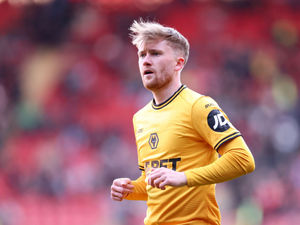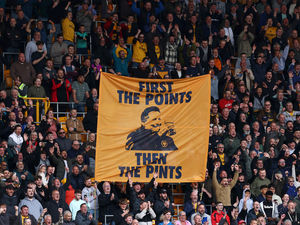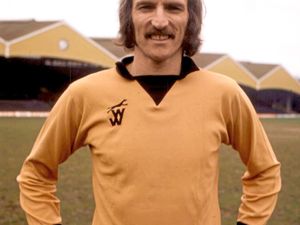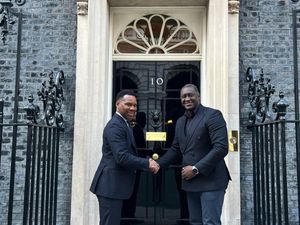Wolves Molineux Kings look back at key capital clashes
Wolves face a pivotal few days on the hunt for some capital gains with Premier League assignments against Arsenal and Tottenham.
Two club legends look back on clashes with the north London pair of yesteryear, including a very similar schedule 40 years ago this month!
London is calling for Wolves over the coming days, north London to be precise, with successive fixtures against Arsenal and Tottenham.
At Molineux tomorrow night, and then the Tottenham Hotspur Stadium on Sunday afternoon, Wolves will go toe-to-toe with two of English football’s biggest names as they aim to continue their gathering pursuit of the top six.
Incredibly, 40 years ago this month, almost to the week, Wolves also faced quick-fire fixtures against Arsenal and Tottenham, both on the road.
Circumstances were very different to now, and both games were lost, 2-1 against the Gunners and 6-1 against Spurs.
Kenny Hibbitt grabbed both Wolves’ goals, at a time when the club’s most recent regular high-end top flight finishes prior to now were on the brink of coming to an end.
The team of the Seventies, which thrilled and excited so many, was approaching the finale of its magical era.
The 1980 League Cup win, still Wolves’ most recent major trophy, and the sixth-placed league finish a few months later which also remains the club’s best in almost 50 years, would prove to be the pinnacle. This modern-day north London double and the same from four decades ago, lends itself to an examination of Wolves’ fortunes against the two during that period, and a look at the stats – namely the goalscorers – throws up two very familiar names.
Hibbitt notched 13 goals in games against Arsenal and Spurs, while John Richards struck 16.
King Kenny and King John. Wolves legends to this day, and yet also maintaining such modesty and humility.
Sadly, they could do little about those successive defeats at a time when Wolves were struggling.
“I certainly remember that 6-1 against Spurs,” Hibbitt recalls.“Ian Greaves had just taken over as manager – it might even have been his first game – and we got hammered.
“My goal came from a free-kick but it didn’t really matter when you think of the result, it was probably one of the only goals I ever scored that I didn’t feel ecstatic about.”
“That game was embarrassing really,” adds Richards.
“It summed up the disappointment of that season, getting a good drubbing, but we had some decent players which made it frustrating.
“Ian Greaves has come in and was very enthusiastic, he loved the game and he could lift you as a player.But we let him down and we let everyone down at Spurs that day.”
There was, however, nothing to be ashamed of for Richards and Hibbitt and the rest of that squad who played their part in another golden era in Wolves’ history, despite a couple of relegations.
Hibbitt made a total of 574 appearances for the club, scoring 114 goals, and Richards’ tally of 194 from 487 games is the second highest in Wolves’ history. All for the measly sum of £5,000 – which was Hibbitt’s transfer fee from Bradford Park Avenue with Richards coming through the ranks.
There were many other similar success stories within a squad which propelled Wolves back to the top end of English football, winning that 1980 League Cup under the management of John Barnwell by beating Nottingham Forest 1-0 at Wembley, on the back of achieving the same feat six years previously by overcoming Manchester City 2-1 when Hibbitt and Richards grabbed the goals.
And yet, there could have been even more success. Which is where Tottenham and Arsenal once again rear their highly annoying heads.
There was the small matter of losing the Uefa Cup Final to Spurs 50 years ago, a League Cup semi-final defeat a year later and also the last four FA Cup replay defeat in 1981.
Add in a couple more FA Cup semi-final defeats to Arsenal in 1979, and Leeds back in 1973, and Wolves were in painfully tantalising sight of more silverware on top of the two Wembley triumphs.
Taking the FA Cup semi-finals against the north London pair in chronological order, it was former Molineux man Alan Sunderland who did part of the damage in gunning down Wolves, joining Frank Stapleton on the scoresheet in a 2-0 victory.
A couple of years later Spurs were the opposition at Hillsborough and, 2-1 down, with full-time approaching, Hibbitt went down after a challenge from Glenn Hoddle, Clive Thomas controversially awarded a penalty, and the nerveless Willie Carr stepped up to take the game into extra-time. Discussion around that spot-kick is one which has certainly stood the test of time.
“I remember thinking as I was getting up that it was a hell of a cheer from our fans behind that goal for a corner,” Hibbitt explains.
“Then John came over and said ‘Hibby, it’s a penalty and you’re taking it’.
“I replied by saying ‘no I wasn’t’, I was knackered!”
“We always had an understanding that if there was a situation where I didn’t fancy taking a penalty, then Willie would step up.
“After that incident I got battered in the Press and from the Tottenham fans and there were some terrible letters sent to me.
“I remember the next league game we played at Tottenham, I was warming up ‘Lofty’ (keeper Phil Parkes) before the game and was getting booed every time I touched the ball.
“I pretended to fall over in the penalty box and the Spurs fans started laughing which seemed to break the ice but then after the game as I was walking to the coach there were about six fans waiting for me outside and I thought ‘Ey up, here we go’.
“I invited them to come over and I sat on the wall and chatted to them about the incident at Hillsborough and they accepted I had fallen over Glenn’s back foot.
“They were as good as gold, they shook my hand and wished me all the best for the future.”
The replay, bizarrely played at Highbury, saw a comfortable 3-0 win for Spurs, continuing their stranglehold over Wolves which had included both the League Cup semi-final in later 1972, and the Uefa Cup final earlier that year.
Which was a particular disappointment, not just because of the result, but also the fact it was such familiar opponents.
“Getting to a European final is what you dream of,” Richards explains. “It had been absolutely fantastic beating teams we had only ever read about like Juventus and Ferencvaros, and we were looking forward to every game as we progressed through the rounds.
“Then it was Spurs in the final, two teams that knew each other so well, and it just felt like we were playing each other in the league again.”
There were at least some positive memories against Arsenal, an FA Cup third-place play-off win when that experiment was being trialled in the early Seventies, along with a stunning win at Molineux in the early stages of Richards’ career.
“One of my best memories against Arsenal is from early in my career, in 1971, when we played them at Molineux in the November,” he says.
“Arsenal had done the league and FA Cup double the previous year, they had players like Bob Wilson, Bob McNab, Charlie George and Frank McLintock, and they were 1-0 up at half-time.
“But we had a bit of a rollicking from Bill McGarry and went out and scored five in the second half including one from Ken – it was a great performance.”
“Arsenal didn’t know what hit them that day,” adds Hibbitt.
“I was looking forward to getting back home to Bradford to watch it back on Match Of The Day with my family – but a blizzard came in and I only got as far as Brownhills before having to turn around and go back to my digs.”
Just a conversation about those fixtures offers a reminder of the levels at which Wolves were operating for many years over the decade, but it was during this period 40 years ago that fortunes started unravelling.
For Richards, it was very much a case of ‘déjà vu’ from the events which transpired following the first League Cup success in ’74, but this time the ship could not be turned.
“What happened 40 years ago was a repeat of what had happened after winning the first League Cup and then getting relegated two years later,” he explains. “And I think they were similar situations in that we still had good players, and the makings of a good team, but it was also an ageing team.
“It was a transition where it needed some good young players to come in but that never really happened, and then the big investment in the new stand then also really affected the playing side.”
Hibbitt adds: “The club has been to hell and back since then, going all the way down to the Fourth Division, and you have to give credit to those who picked it all up from there and started to bring them back.
“Things have changed dramatically over the last few years and Wolves is now again where I feel it should be, and the fans are happier than I have seen them for a long, long time.”
The very fact Wolves are knocking on the door once again brings back conversation of that team of the Seventies, their personalities, their successes, and how they have remained so close through the years.
“We were a group of young lads from different parts of the country who came together at the right time and mixed in with the experience of those such as the Doog, Waggy, Mike (Bailey) and Frank (Munro),” says Richards.
“We also benefitted from the legendary team of the Fifties, because that huge support had been there for that great team but they had then been through a quiet 10 years in comparison to what had gone before.
“Suddenly the fans felt they had a team they could support and they got right behind us and as players we were like a family.
“Kenny is like a brother to me in so many respects, and the other lads too, and we all feel very lucky to have been part of that time we had at Wolves.”
“We were all so very proud to have worn the gold and black shirts for that long,” Hibbitt reflects.
“Wolves gave us a fantastic career, it was wonderful playing in front of superb crowds and, even now, when I watch a game at Molineux or on the TV and see the players walk out it gives me goosebumps.
“Molineux is such a special place to play, and what is happening now is great for the fans and great for the club and I hope they can continue the way they are going.”
Next on that journey is Arsenal tomorrow, Spurs on Sunday, with Manchester City, Chelsea and Liverpool and the rest still to come as Wolves mix it with the big boys in pursuit of a strong second half to the season.
And, in doing so, continuing to revive memories of another golden era when Richards, Hibbitt and company were the Kings of Molineux.





